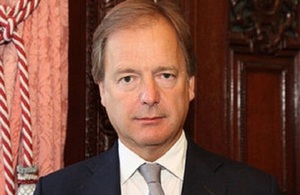Hugo Swire responds to letters on Burma's political reforms
Foreign Office Minister Hugo Swire has responded to members of the public concerned about Burma's political reforms.

Hugo Swire
The Prime Minister has received a large number of e-mails recently from members of the public expressing concern about the current situation in Burma. As Minister responsible for our relations with Burma, I would like to take this opportunity to explain what the British Government is doing to address these concerns and to encourage further reform.
Much of the recent correspondence suggests that reforms in Burma have stalled and in some areas have reversed. We are by no means complacent, and recognise the reservations expressed by Aung San Suu Kyi and others. Indeed, we regularly discuss these concerns with her and we are working closely with her in many areas.
In particular, we are aware of the ongoing human rights abuses in the country, and continue our active lobbying of the government on the breadth of these abuses. We have raised the appalling and worsening situation in Rakhine State and will continue to urge the government to respect the human rights of the Rohingya. We have also raised with the government the recent intimidation, detention and sentencing of reporters and political activists. We are deeply concerned about ongoing conflict in ethnic areas and associated human rights abuses, not least sexual violence (I have written separately about this). We continue to lobby for unhindered humanitarian access across Burma.
However, we must also acknowledge the significant progress made since 2011. There remains a long way to go, but let us not forget that as recently as 2010, Burma was still a military dictatorship. As Yanghee Lee, the UN Special Rapporteur on Human Rights in Burma, has said, “far-reaching reforms have dramatically transformed the political, economic, social and human rights landscape”. The government has improved the scope for freedom of expression. Many hundreds of political prisoners have been released. The government and ethnic groups are working towards a nationwide ceasefire. In 2014, 376 child soldiers were released from service. In June, Burma endorsed the Declaration of Commitment to End Sexual Violence in Conflict. In December, Burma acceded to the Biological Weapons Convention. For the first time, we have seen jurisdiction on cases involving military officers being handed over to civilian courts to help bring justice for survivors of sexual violence. These steps represent an improvement upon the past situation.
We also have to be realistic about the pace of change. Burma is undertaking a complex transition: from an authoritarian military regime to democratic government; from a centrally directed to a market oriented economy; and from decades of conflict to peace in the border areas. This process was never going to be quick or easy. In this context, our continued engagement and support for the people of Burma is more vital than ever.
In light of this, we are providing practical support. Our aid in Rakhine state supports shelter, water sanitation and hygiene programmes, nutrition and protection activities, as well as non-food items for over 114,000 people from both Rakhine and Rohingya communities. We also provide humanitarian assistance for internally displaced persons (IDPs) affected by the violence in Kachin and Northern Shan States. This aid is providing food security, sanitation and health to accepted humanitarian standards, as well as to strengthening IDP communities’ capacity to manage health hazards and risks.
At the same time, we are working with government, parliament, business, civil society and international organisations to help build an economy which generates strong, sustainable and balanced growth that builds prosperity and reduces poverty in Burma. We have supported Burma’s successful application to the Extractive Industries Transparency Initiative (EITI). We are also working to ensure international standards are adopted and enforced around a whole host of related issues, including responsible business, conflict-sensitive economic governance, environmental and social impact assessments, corporate and social responsibility, corporate governance and transparency. We continue to share, with Burma’s public and private sectors, the UK’s experience of developing our own Action Plan to implement the UN Guiding Principles on Business and Human Rights.
Vital to all of our efforts is an engagement with the Burmese military. Many of the letters we have received express unease about this, but I believe it is absolutely necessary if we are to see sustained and long-term reform. The military has a long history in Burma and will undoubtedly remain an important institution in the years ahead. The focus of our defence engagement is to encourage their adherence to the core principles of democratic accountability, international law and human rights. Aung San Suu Kyi and others have actively encouraged this engagement.
The reforms that we all want to see in Burma will not be quick or easy. As President Obama said during his visit in November, “change is hard and it doesn’t always move in a straight line”. Our efforts to promote human rights, democratisation and a lasting peace process will take time - but 2015 will clearly a crucial year. The elections will be a landmark in Burma’s transition and it is important for its political and economic future that they are credible and inclusive, and that they represent the will of the people. The legacy of a government which initiated reforms and then presided over such elections would be historic. In the run-up to the elections the UK will encourage all of Burma’s main political actors to build a regular dialogue to manage this process.
If you require any further information, please consult the UK and Burma website, follow us on Facebook or Twitter: @UKinBurma.